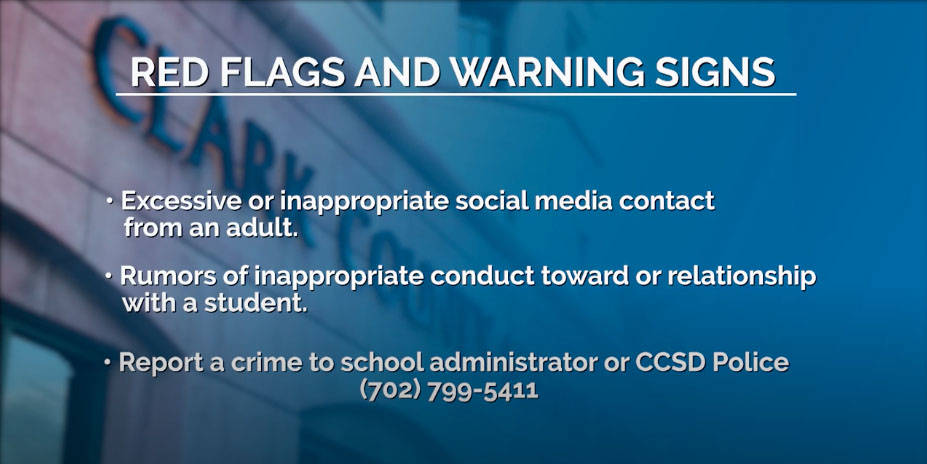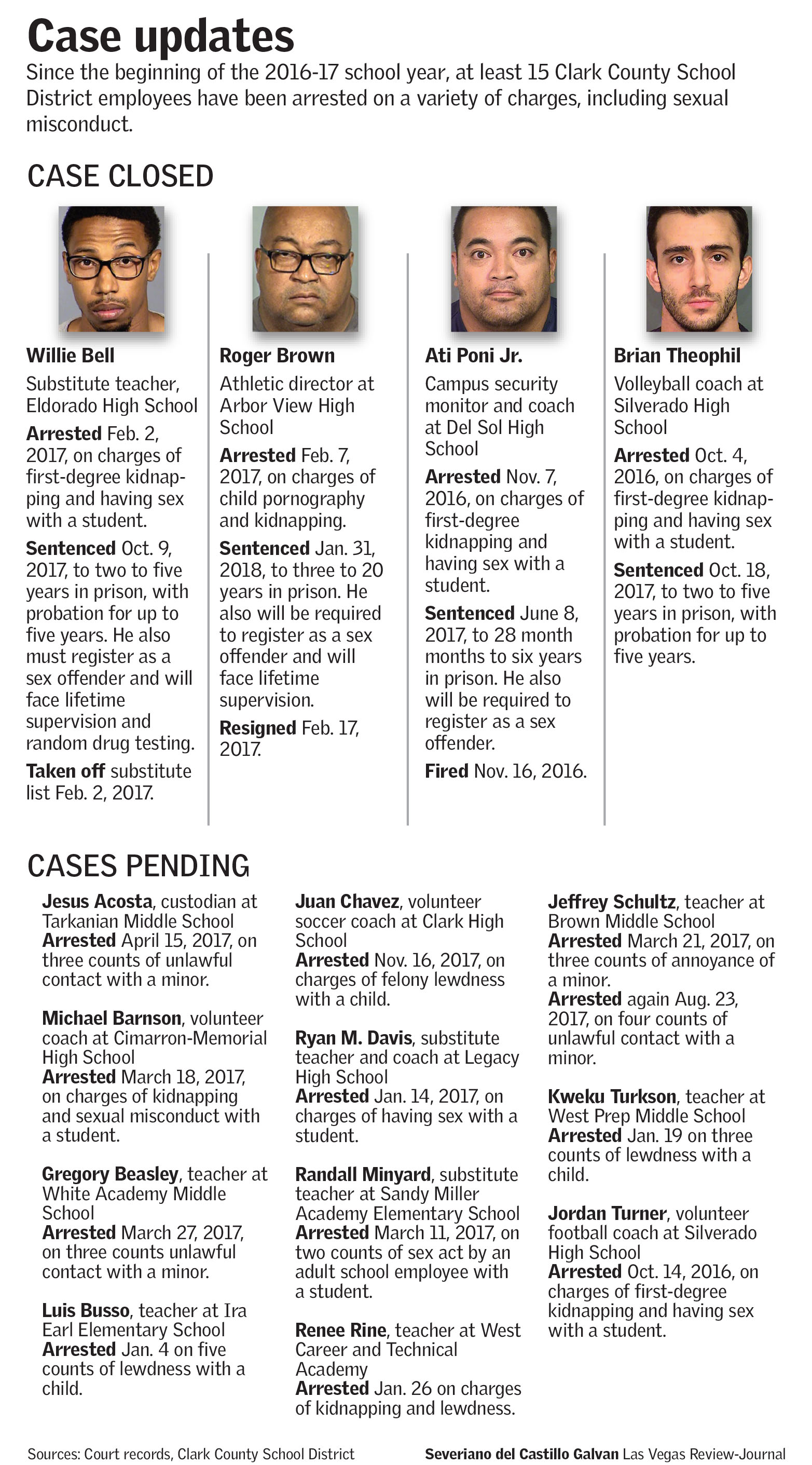Misconduct training videos for Clark County schools criticized


Clark County schools had a chance to lead the nation in training employees on appropriate relationships with students but instead issued flawed videos that fail to address a number of concerns, according to experts who reviewed the new recordings at the request of the Review-Journal.
The researchers, whom the district approached for advice last summer when it began work to upgrade its training program amid a spate of employee sexual misconduct cases, said the new videos are an improvement.
But they say they could have been much better if officials had accepted an offer to include the district in a new pilot training program at no cost. The district failed to seize the opportunity, and subsequently released new training videos that focus mainly on how employees should interact with students on social media, which they say is only part of the problem.
“They never took us up on the offer, they stopped returning calls, they sort of went in this other direction,” said Glenn Lipson, a researcher who consulted with the district and has created a training program called “Making Right Choices.”
Under a grant through Stop Educator Sexual Abuse Misconduct and Exploitation (SESAME) – one of the nation’s only nonprofits focused on preventing sexual misconduct in schools – Clark County employees would have undergone training with Lipson’s team. SESAME is based in Las Vegas and is run by Terri Miller, a leading national advocate for laws and improved training to address the problem.
Afterward, the program would have been evaluated for effectiveness by Billie-Jo Grant, a senior researcher with Virginia-based Magnolia Consulting and a member of the SESAME board. Grant recently presented a Title IX report to the U.S. Department of Justice and is considered one of the preeminent researchers in the field.
Materials developed in-house
The “other direction” that the district took included developing a new social media policy for employees and issuing a new set of four videos aimed at educating students, parents and employees on appropriate relationships. CCSD sought feedback from the experts, but produced the videos in-house.
In an email, district officials didn’t dispute the experts’ account and said they appreciated the feedback, but did not directly address why they did not accept the grant.
“We are always open to discussing future opportunities to improve our training,” spokeswoman Kirsten Searer said.
The district unveiled the new training videos in late January, saying they would erase any uncertainty about the limits of proper interactions between employees and students.
“The vast majority of our employees are dedicated professionals who care deeply for the safety of our students,” Superintendent Pat Skorkowsky said in a statement. “These videos will help our employees, coaches and volunteers set appropriate boundaries that protect them as well as students.”
The videos were reviewed by national experts at the request of the Review-Journal, which examined the sexual misconduct issue in a series last spring titled “Broken Trust.”
“I think it’s great they put something together,” said Grant, the school misconduct researcher. “We still need to do more training for people on what it is, how it happens, how you can identify it and how to make a report. There’s multiple steps involved.”
Training videos
Until fall, the district had no policy on how employees should interact with students and relied on a vague, outdated nine-minute training video that included incorrect information on state laws.
Now, the district has four separate videos – one for parents, one for employees, one for all students and one for students in grades six and lower. It’s up to parents whether they watch the videos, which are posted online. All district employees are required to watch the training video on campus in a group viewing session by the end of March. Students are also required towatch the videos in their classes by the end of March.
By tailoring the videos for different audiences and including voices of “stakeholders” like parents, teachers and law enforcement officials in the videos, the district addressed some concerns raised by the experts about its previous training materials. But the experts said the videos still have some fundamental flaws.
One for students, for example, states that they shouldn’t have “romantic relationships” with employees, a phrase that Grant, speaking as a SESAME board member, said should not be used.
“That’s not what these are. This is abuse and misconduct,” she said. “You shouldn’t use that terminology, especially in a training video.”
The videos also don’t provide enough examples of “grooming behavior,” a term to describe actions adults use to lure minors into inappropriate relationships. Nor do they provide enough information on what actions to report and where to report them, the experts said.
Julie Brand, a retired Colorado counselor who lives in Henderson and studies female sex offenders, said the videos for students also fail to take into account how children learn.
“They need to slow it down, give examples,” said Brand, who works with SESAME. The video created for all students is about 90 seconds long, and mostly warns students about interacting with stangers online, telling them not to share personal information or meet someone in real life.
“We’re still doing stranger danger when in fact the majority of kids who are sexually abused or assaulted know their perpetrators,” Brand said.
‘Consistent message’
At Foothill High School, in Henderson, the majority of staff, employees and volunteers watched the new video at a joint meeting with Principal Lisa Burkhead. Teachers also were provided with other resources to help identify and report child abuse.
“I think it’s important that a consistent message is sent across the entire district,” she said.
Some employees who couldn’t make the staff meeting watched the video later with a Review-Journal reporter present. Most said they found the information to be commonsense, but agreed that the message was more understandable than the old video.
“I think it makes the policy a little more clear,” said Casandra Iglitz, the school’s special education instruction facilitator.
The policy, and the accompanying video for teachers, mostly focuses on the do’s and don’t’s of communicating with students online, as well as warning that sexual relationships with students are prohibited by law.
For some teachers, complying with the new social media policy — which focuses on how and when they should message students on various platforms — won’t be an issue. But for those who also coach sports or advise clubs, it creates additional work.
Andrew Risheg, a site-based technician at Foothill, also coaches boys soccer, track and helps with the student council. He said he already tries to limit his one-on-one conversations with students but will have to add another layer of reporting — sticking his head in the principal’s office to update her on all his conversations, per the policy requirements.
“It’s a little bit too restrictive,” he said of the new policy.
Wyatt Aping, a history teacher and the student council advisor, agreed. For his class assignments and communications, he uses a district-approved site called Remind to send text-based messages to students. But that site has a word-count cap and he said students often don’t turn notifications on, making texting a better option.
“For advising, (student council) is an organization where there’s stuff going on all the time,” he said, explaining the need for frequent messaging.
An earlier version of this article contained inaccurate information about whether students were required to view the videos.
Contact Meghin Delaney at 702-383-0281 or mdelaney@reviewjournal.com. Follow @MeghinDelaney on Twitter.

Arrests persist
Despite the focus on the problem of sexual misconduct over the past year, which included new laws passed by the state Legislature, new protocols for the district in announcing employee arrests and the district’s first social media policy, the number of employees arrested on similar charges has not significantly decreased.
Since school began this year, six school district employees have been arrested on charges of sexual misconduct with students, including one teacher who allegedly began a relationship with a student two years ago and attempted to carry on with it throughout the public meetings and new training.
A teacher who was arrested during the 2016-17 school year also was arrested again this year on similar charges.
Three others school district employees have been arrested on child abuse charges for physically disciplining students. One employee was arrested on burglary charges.













